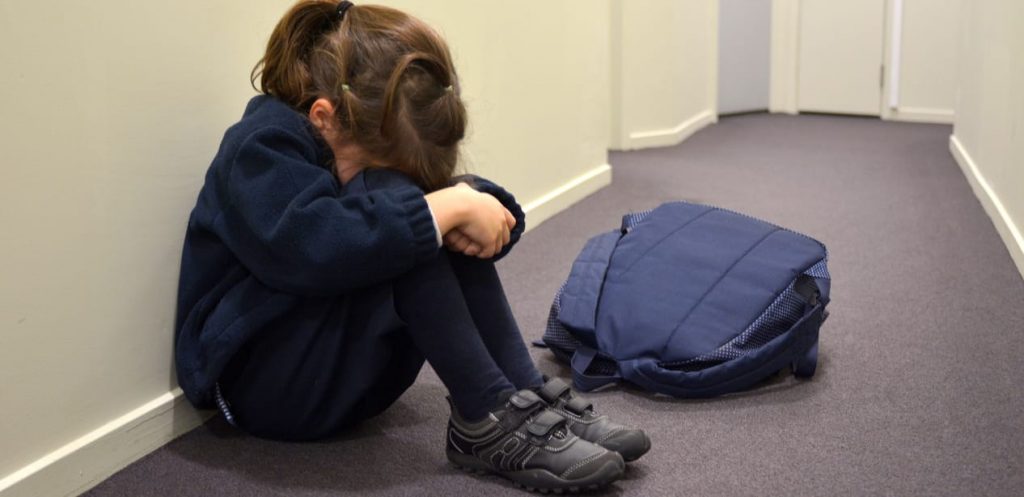Many children go through phases of not wanting to go to school (Sunday morning struggle, anyone?) but regularly refusing school or going to extremes to avoid attending can indicate a major issue
Truanting is, in itself, a serious matter; if your child is failing to turn up on a regular basis, you could be faced with legal action. But if he or she is displaying anxiety towards school, it could be that there’s an underlying problem that needs addressing.
And if you do have trouble getting your child to go to school, take comfort in the fact that you’re not alone. Mums have shared their stories, helping to identify possible reasons for the anxiety, and suggesting ways to approach the issue.
First things first: why might your child be refusing school?
1) Separation anxiety
Younger children in particular may not want to be apart from parents or family and familiar settings.
- “My son’s always been on the anxious side, but since starting school he’s been having screaming/crying fits, clinging to me/my husband and physically resisting getting ready for and going to school.”
2) Trouble with friends
Sometimes bullying or arguments among friendship groups can cause children to feel withdrawn and even put them off going to school altogether. Bullying can seriously effect self-esteem and arguments with friends can throw their social norms off balance.
- “When my son started flatly refusing to go to school and getting hysterical it turned out that there was bullying going on, but the insidious whispering, calling-names kind which the teachers couldn’t spot and he found hard to call bullying, yet it made him very unhappy.”
3) Anxiety about PE
Doing sports at school can be anxiety-inducing: the process of getting changed into PE kit, competing against other children and the fear of being picked last for teams.
- “My son doesn’t want to go to school on PE day. He struggles to get changed because of hyper mobility. He is always the last one to get ready. The exercises make him feel sick. He worries that no one will choose him to be their partner.”
4) Fear of failure
If a child is struggling academically, they might think it’s easier to remove themselves from learning altogether rather than admit they’re having difficulty, or having others point out their inadequacies. Equally, if they’ve always done well they may feel a lot of pressure to meet high expectations, particularly when it comes to exam time.
- “My daughter reacts very badly when put under any kind of perceived pressure – hated the SATs, hates working on the computer in class as friends constantly want to compare results etc.”
- “Many teens stop trying because they are afraid of trying and failing; somehow this seems more shaming than never having tried in the first place.”
Is there evidence of anxiety?
1) A pattern of avoidance
Some children can get headstrong about refusing to go to school. This is often more of an issue with older kids who are trying to assert their independence and test the boundaries.
- “It’s week four and my 14-year-old son has already missed three different days. For no reason – can’t get up, can’t be bothered, doesn’t see the point. I’ve heard it all for the past two years. My fears are confirmed: not a problem with the school or the teachers or the work. It’s just him. This is his pattern. If he doesn’t feel like doing something, he simply doesn’t do it… He is bright and works hard when he wants to. He just doesn’t want to very often.”
2) Self-harming
Children may go to extreme measures to deal with their anxiety, self-harming or inducing vomiting to avoid going to school.
- “I found out that my 14-year-old daughter had been making herself sick to get out of going to school, and had also become very withdrawn … She has admitted that on the days I do try to get her to go school, she harms herself to find a way out of going.”
3) Panic attacks
At its most extreme, school refusal is a disorder, where children’s anxiety results in a physical reaction – anything from being sick to shaking, sweating, increased heart rate and shortness of breath.
- “My son is petrified of school and feels he doesn’t have any friends and that no one likes him. He gets hysterical and has panic attacks, gets himself in such a state and is shaking all over.”
OK: you’ve identified the problem. Now what?
1) Talk to the school
It can help to speak to the school, in person or in writing, to find out if they know what is making your child anxious about going.
- “Still make your child go to school, but try and find out what it is [that is making them refuse to go]. Speak to teachers and see if they can find any evidence of bullying.”
- “It is hard, but try to deflect as much as you can onto the school, rather than onto him or you. That is the only way you’ll get help with it. Ask them what they can do to make him want to attend, or less anxious to attend.”
2) Remove some of the pressure
If overwork or inflated expectations are the problem, dropping subjects can help to take the pressure off and allow children to catch up on any work they’ve missed or fallen behind with. This may not always be a viable option, of course, so discuss it with the school first.
- “We had a VERY gradual returned phase-in to school and she dropped two subjects to take the pressure off her and give her one or two free periods a week to catch up.”
3) Try reverse psychology
Some mums find that feigning indifference or using a little reverse psychology can do the trick – but this isn’t a recommended route if your child’s anxiety is a serious issue, in which case the symptoms shouldn’t be ignored.
- “Making out like I am so fed up that I no longer give a toss gets more positive results that punishments.”
- “Agreeing with him that, yes, he can choose to blow out his college/future if he wants to, and that frankly I am beyond caring, is more likely to get him out of bed than nagging (I think because ultimately he knows at some level what’s best for him).”
4) Get your child to talk to someone
You’ve asked your child why they’re feeling worried or sad ar angry about school and tried to get them to explain what’s triggering their worry – but don’t be angry if they can’t, or don’t want to, talk to you. Sometimes it can help to talk to someone more impartial, such as a counsellor or a doctor.
- “What helped more than anything was seeing the school counsellor who wasn’t Mum or a teacher but knew the way school worked and was there to support her and give her a safe space to retreat to if it all got too much.”






